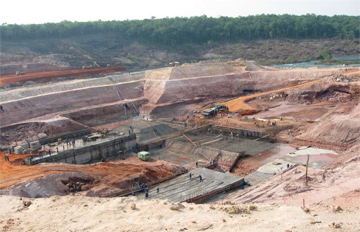Efforts to slow climate change are putting indigenous people at risk, warns a new report published by Survival International, an indigenous rights’ group.
The report, ‘The most inconvenient truth of all: climate change and indigenous people,’ argues that lack of recognition of indigenous land use leaves them vulnerable to displacement and environmental harm by projects done in the name of climate change mitigation, including dams, agricultural expansion for biofuels production, and carbon conservation schemes.
 A new dam being built in the Brazilian Amazon rainforest. Hydroelectric projects qualified for carbon payments under the Kyoto Protocol’s CDM mechanism despite evidence showing that dams established in tropical forest areas generated substantial greenhouse gas emissions from rotting vegetation. Image © Survival |
The report calls for indigenous people to be fully involved in decisions that affect them and recognition and upholding of their traditional land use and ownership rights.
“This report highlights ‘the most inconvenient truth of all’ – that the world’s tribal people, who have done the least to cause climate change and are most affected by it, are now having their rights violated and land devastated in the name of attempts to stop it,” said Survival International Director Stephen Corry in a statement.
The report highlights the risk that REDD, a proposed climate change mitigation scheme that would compensate tropical countries for protecting forests, could lead to forced displacement of tribal groups from their lands by carbon traders if proper safeguards aren’t put into place. Under a poorly designed REDD mechanism, forest conservation initiatives could also potentially bar indigenous people from forests they have long used on a sustainable basis.
The most inconvenient truth of all: climate change and indigenous people
Related articles